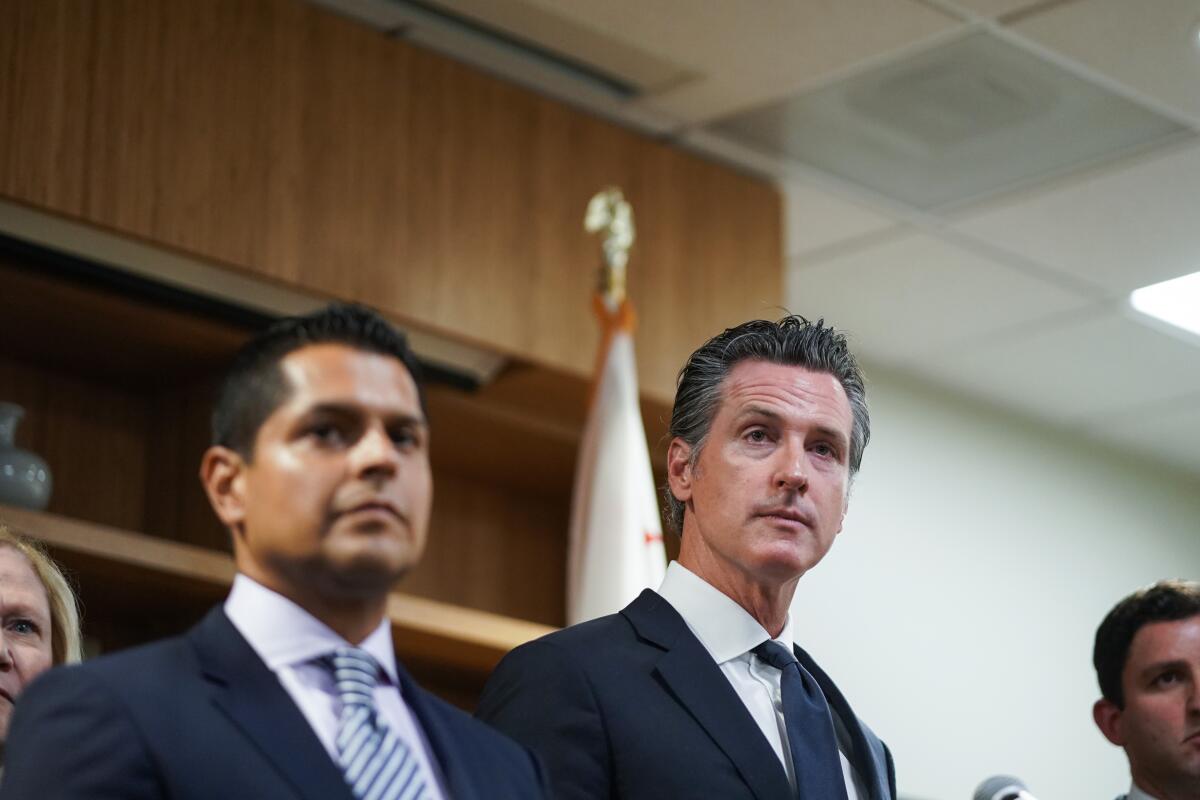Newsom backs effort to cap rent increases in California

- Share via
An effort to cap annual rent increases in California received a boost Wednesday when Gov. Gavin Newsom embraced the idea and said he wants even more restrictions than currently planned.
“I’m hopeful … that I will get on my desk in the very near term a rent cap bill because it is long overdue in the state of California,” Newsom said at a Wednesday event in Los Angeles unveiling new funding to protect renters from evictions.
Assembly Bill 1482 from Assemblyman David Chiu (D-San Francisco), which is pending in the state Legislature, would limit annual rent increases statewide to 7% plus inflation for the next three years. It would also, over the same period, prevent landlords from evicting their tenants without first providing a reason. The bill would not apply to apartments built within the last decade and, in most cases, to single-family home rentals.
The governor said he wanted to see stricter controls for tenants placed in the bill.
“I think we can take it another notch up,” Newsom said.
About 9.5 million renters — more than half of California’s tenant population — are considered “rent burdened” , spending at least 30% of their income on housing costs, according to a UC Berkeley study. The governor’s backing could help advance efforts to add tenant protections that have so far struggled to garner support in the Legislature and at the ballot box.
Last fall, an initiative that would have expanded rent control was defeated by nearly 20 percentage points following a $100-million campaign in which landlord groups dramatically outspent supporters. During his State of the State speech in February, Newsom said he would sign a package of bills to provide greater stability for renters if the Legislature passed them, but he did not specify what measures he hoped to advance.
Democratic lawmakers later introduced a series of bills aimed at restricting rent increases and limiting evictions, including legislation that would have allowed cities and counties to add tougher rent controls than currently permissible under state law. Those bills, however, have either failed or been significantly narrowed.
Earlier versions of Chiu’s bill would have capped annual rent hikes at 5% plus inflation and the restrictions would have been in place for a decade. But he weakened the bill in May in an effort to persuade the California Assn. of Realtors, a significant interest group, to drop its opposition.
Chiu has since added provisions that would limit evictions without landlords first listing a cause, further complicating the bill’s chances at passage. Earlier this year, legislation seeking the same protection failed to advance in the Assembly. The California Apartment Assn., which represents landlords, remains staunchly opposed to AB 1482, arguing that it would hurt new construction and spur additional attempts by lawmakers to lower the rent cap in future years.
Chiu said he welcomed the governor’s assistance in trying to break through some of the difficult politics surrounding the bill.
Newsom “made references to wanting as strong a bill as possible, and that’s certainly what I want,” Chiu said. “We appreciate and look forward to the governor’s help in getting a strong bill over the finish line.”
Meanwhile, another potential ballot initiative is being discussed for 2020, something Newsom said Wednesday he wanted to avoid.
The L.A.-based AIDS Healthcare Foundation is collecting signatures to place a rent control effort on the ballot next year that’s much stricter than Chiu’s proposal. The proposed initiative includes a provision that would limit how much a landlord could increase rents when a new tenant moves in, something now prohibited under state law. Michael Weinstein, the foundation’s president, has said he would withdraw the initiative if the Legislature passed sufficient renter protections, but he believes Chiu’s bill is not strong enough.
Times staff writer Benjamin Oreskes contributed to this report.
More to Read
Sign up for Essential California
The most important California stories and recommendations in your inbox every morning.
You may occasionally receive promotional content from the Los Angeles Times.











